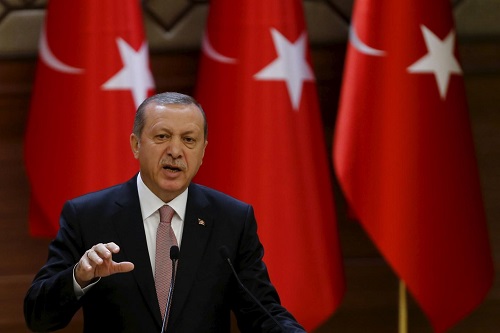Reuters photo
By
Tom Arms
You would have thought that President Recep Tayyip Erdogan was a dead cert for re-election in the Turkish elections which start on the 24th of June. He controls the media, has packed the judiciary, locked up political opponents and moved the elections forward a year so that they can be held under the martial law he imposed.
Think again, the latest opinion polls put the strongman Turk at 50.8 percent of the vote and dropping. If he fails to win an outright majority in the first round then a second run-off round will be held between Erdogan and the runner-up. The other four candidates are all expected to throw their support behind the runner-up.
The united opposition is the result of Erdogan’s constitutional changes which this election will confirm. The Turkish governmental structure has been changed from a parliamentary system to an executive president with near-dictatorial powers. The president has the right to appoint the vice-president and all his cabinet ministers; controls the budget; rule by decree; and declare martial law and states of emergency.
All five of the other candidates oppose the new presidential powers and have promised a return to the old parliamentary system.
Erdogan’s closest opponent for the presidency is Muharrem Ince of the CHP. He stands at 30.1 percent in the polls. Ince is followed by pro-Kurdish HDP candidate Selahattin Demirtas, who despite running his campaign from prison, polls at 10.5 percent. Former Interior Minister Meral Aksener of the new Iyi Party polls 8 percent, trailing most expectations.
The type of government on offer is important to voters, but perhaps more important to the man and woman in the street is the cash in their pockets. They have put up with Erdogan’s strong-arm tactics while the Turkish economy was growing at 8-11 percent a year. But lately the Turkish lira has plunged and inflation has soared.
Voters are beginning to question Erdogan’s economic credentials, especially when the markets reacted badly to his unconventional theories on economic fundamentals in an attack on the Turkish Central Bank. This was exacerbated when, in an interview with Bloomberg Television, Erdogan said he would consider taking greater control of monetary policy after the vote.
But while a plurality of respondents – 35.9 percent – said their living standards had gotten worse in the past year, very few of his supporters are likely to turn on him. Erdogan has become an icon among members of the ruling Justice and Development Party (AKP). Ninety-five percent of its grass roots members said they would vote for Erdogan. That is not, however, 95 percent of the population.
Tom Arms
I am a journalist, entrepreneur and historian with extensive experience in print, web and broadcast journalism. I started as a diplomatic correspondent, wrote several books (The Falklands Crisis, World Elections On File and the Encyclopedia of the Cold War), and then in 1987 started my own business (Future Events News Service, www.fensinformation.com) which over 25 years established itself as the world and UK media’s diary. Our strapline was: “We set the world’s news agenda.” I sold FENS in December 2012 but retained the exclusive broadcast rights to all of FENS data. To exploit these rights I set up LookAhead TV which produces unique programmes which “Broadcasts Tomorrow Today” so that viewers can “Plan to Participate.” LookAhead has appeared regularly on Vox Africa, Radio Tatras International, The Conversation and Voice of Africa Radio.
In addition to being a syndicated broadcaster and columnist on global affairs, Tom is also available for speaking engagements and can be contacted on Twitter, Linkedin and email: [email protected].



No Comments Yet!
You can be first to comment this post!